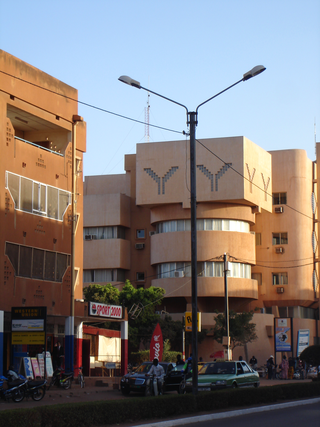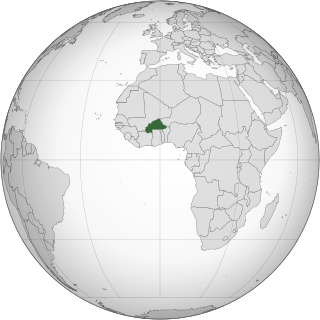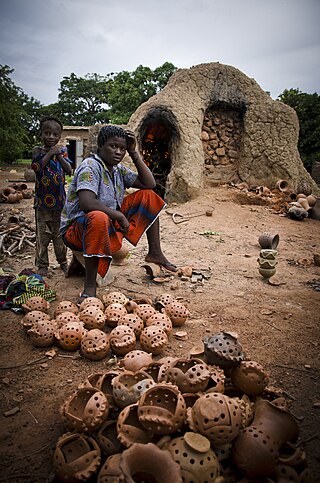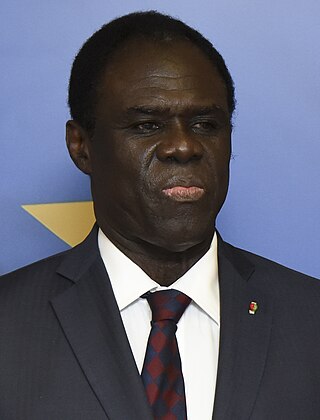Related Research Articles

Burkina Faso, officially the People's Republic of Burkina Faso, is a landlocked country in West Africa, bordered by Mali to the northwest, Niger to the northeast, Benin to the southeast, Togo and Ghana to the south, and Ivory Coast to the southwest. It covers an area of 274,223 km2. In 2021, the country had an estimated population of approximately 23,674,480. Previously called the Republic of Upper Volta (1958–1984), it was renamed Burkina Faso by former president Thomas Sankara. Its citizens are known as Burkinabè, and its capital and largest city is Ouagadougou.

The economy of Burkina Faso is based primarily on subsistence farming and livestock raising. Burkina Faso has an average income purchasing-power-parity per capita of $1,900 and nominal per capita of $790 in 2014. More than 80% of the population relies on subsistence agriculture, with only a small fraction directly involved in industry and services. Highly variable rainfall, poor soils, lack of adequate communications and other infrastructure, a low literacy rate, and a stagnant economy are all longstanding problems of this landlocked country. The export economy also remained subject to fluctuations in world prices.

Lesbian, gay, bisexual, transgender, and queer (LGBTQ) people in Burkina Faso face legal issues not experienced by non-LGBTQ citizens. Although same-sex sexual acts are legal for both men and women in Burkina Faso, there is no legal recognition of same-sex marriage or adoption rights.

Boucle du Mouhoun is one of Burkina Faso's 13 administrative regions. It was created on 2 July 2001 and had a population of 1,898,133 in 2019. It is the 4th most populous region in Burkina Faso, and contains 9.26% of all Burkinabé. The region's capital is Dédougou. Six provinces make up the Boucle du Mouhoun region—Balé, Banwa, Kossi, Mouhoun, Nayala, and Sourou.

Cascades is one of Burkina Faso's 13 administrative regions. It was created on 2 July 2001. The population of Cascades was 812,062 in 2019. It is the second least populous region in Burkina Faso and contains 3.96% of all Burkinabé. The region's capital is Banfora. Two provinces, Comoé and Léraba, make up the region. The Cascades de Karfiguéla give the region its name.

Centre-Est is one of Burkina Faso's 13 administrative regions. The population of Centre-Est was 1,578,075 in 2019. The region's capital is Tenkodogo. Three provinces make up the region.

Centre-Nord is one of thirteen administrative regions of Burkina Faso, a landlocked country in Africa. The population of Centre-Nord in 2019 was 1,872,126. The region's capital is Kaya. Three provinces—Bam, Namentenga, and Sanmatenga, make up the region.

Centre-Ouest is one of Burkina Faso's 13 administrative regions. The population of Centre-Ouest was 1,659,339 in 2019. The region's capital is Koudougou. Four provinces make up the region.

Centre-Sud is one of Burkina Faso's 13 administrative regions. The population of Centre-Sud was 638,379 in 2006 and was estimated at 722,631 in 2011. The region's capital is Manga. Three provinces – Bazèga, Nahouri, and Zoundwéogo – make up the region.

Est is one of Burkina Faso's 13 administrative regions. It was created on 2 July 2001. The region's capital is Fada N'gourma. Five provinces make up the region—Gnagna, Gourma, Komondjari, Kompienga, and Tapoa.

Plateau-Central is one of Burkina Faso's 13 administrative regions. It was created on 2 July 2001 and had a population of 977,510 in 2019. The region's capital is Ziniaré. Three provinces make up the region—Ganzourgou, Kourwéogo, and Oubritenga.

Sud-Ouest is one of Burkina Faso's 13 administrative regions. It was created on July 2, 2001 and had a population of 874,030 in 2019. It covers an area of 16,153 km2. The region's capital is Gaoua. Four provinces make up the region—Bougouriba, Ioba, Noumbiel, and Poni.

Islam in Burkina Faso has a long and varied history. According to the 2010 census, the population of the country was 63.2% Muslim. The 2019 census notes that 63.8% of the population are Muslim

Michel Kafando is a Burkinabé diplomat who served as the transitional President of Burkina Faso from 2014 to 2015. He served in the government as Minister of Foreign Affairs from 1982 to 1983 and was the Permanent Representative (Ambassador) of Burkina Faso to the United Nations from 1998 to 2011.

A landlocked sub-Saharan country, Burkina Faso is among the poorest countries in the world—44 percent of its population lives below the international poverty line of US$1.90 per day —and it ranks 185th out of 188 countries on UNDP's 2016 Human Development Index. Rapid population growth, gender inequality, and low levels of educational attainment contribute to food insecurity and poverty in Burkina Faso. The total population is just over 20 million with the estimated population growth rate is 3.1 percent per year and seven out of 10 Burkinabe are younger than 30. Total health care expenditures were an estimated 5% of GDP. Total expenditure on health per capita is 82 in 2014.
Prostitution in Burkina Faso is not specifically prohibited by the law, but soliciting and pimping are illegal. Burkinabe society only accepts sexual intercourse within marriage. In 2009, Voice of America reported that the number of prostitutes in Burkina Faso had increased as a result of the country's poverty. The increase in prostitution has given rise to fears of an increase in the number of Burkinabés infected with HIV and AIDS. UNAIDS estimate there to be 31,000 prostitutes in the country.

Burkinabe nationality law is regulated by the Constitution of Burkina Faso, as amended; the Persons and Family Code, and its revisions; and various international agreements to which the country is a signatory. These laws determine who is, or is eligible to be, a national of Burkina Faso. The legal means to acquire nationality, formal legal membership in a nation, differ from the domestic relationship of rights and obligations between a national and the nation, known as citizenship. Burkinabe nationality is typically obtained under the principle of jus sanguinis, i.e. by birth in Burkina Faso or abroad to parents with Burkinabe nationality. It can be granted to persons with an affiliation to the country, or to a permanent resident who has lived in the country for a given period of time through naturalization.
Catherine Ouedraogo is a Women Human Rights Defender and a farmer from Koho Gnabiro village in Burkina Faso. She has run the Fondation Cardinale Emile Biyenda (FOCEB) shelter in Ouagadougou since 2005. The shelter takes in girls aged 12 to 18 who have survived rape, early and forced marriage and unwanted pregnancy. Between 2001 and 2009, the shelter accommodated at least 209 girls and their 168 children, who were either born there or taken in with their mothers.
Hortense Lougué is a Woman Human Rights Defender and the Executive Director of the Association of Support and Awakening Pugsada (ADEP), a non-governmental organisation that focuses on improving the legal, and socio-economic status of women and girls in Burkina Faso. She works extensively with young girls and women who have been forced into marriage, are victims of gender violence or have suffered female genital mutilation. Having been a volunteer in the Pugsada association, she became the coordinator and chief executive when the founder took over international duties in 2008. Her drive to do this originated from her experience of inequality and injustice.
Bibata Ouédraogo is a Burkinabé feminist, women's rights activist and former school teacher.
